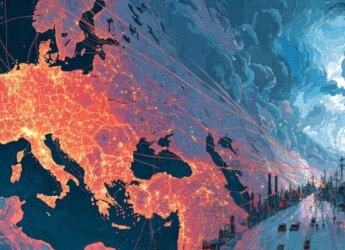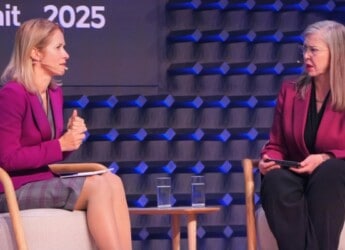|
|
Content Assessment: Bridges (And Drones) Over Troubled Waters? Russo-Ukrainian War Update (July 31 - August 6, 2023)
Information - 93%
Insight - 92%
Relevance - 93%
Objectivity - 93%
Authority - 95%
93%
Excellent
A short percentage-based assessment of the qualitative benefit of the post highlighting the recent Ukraine conflict assessments in maps from the Institute for the Study of War.
Editor’s Note: This article provides a comprehensive update on the Russian offensive campaign in Ukraine, focusing on key developments from July 31 to August 6, 2023. It underscores the strategic maneuvers, tactical shifts, and political dialogues surrounding this intense conflict. For professionals in cybersecurity, information governance, and eDiscovery, the insights offered by this article can enhance understanding of the geopolitical landscape and its potential impact on data security, information management, and legal discovery processes in a global context.
Background Note: Over the course of a week, from July 31 to August 6, 2023, the conflict between Russia and Ukraine saw numerous tactical shifts, strategic maneuvers, and political dialogues unfold. Ukraine’s counteroffensive operations targeted vital Russian ground lines of communication (GLOCs), including two key road bridges connecting occupied Crimea and Kherson Oblast. These strikes forced Russian forces to redirect road traffic from shorter eastern routes to longer western ones.
Ukrainian forces also targeted Russian shipping, striking a Russian oil tanker with a naval drone. This move likely forms part of a broader interdiction campaign to set the stage for larger counteroffensive operations. Meanwhile, Russian forces conducted one of the largest missile and drone strike series on Ukraine in recent months.
The impact of these strikes has been significant. Ukrainian officials reported that their air defenses have destroyed 3,500 aerial targets since Russia’s full-scale invasion commenced on February 24, 2022. Despite the intense conflict, international talks aimed at defining the main principles for a future settlement to the war continued in Jeddah, Saudi Arabia.
On the Russian side, Kremlin Spokesperson Dmitry Peskov provided an unclear response when asked whether Russia seeks to annex more Ukrainian territory beyond the four partially occupied oblasts it annexed illegally in September 2022. Amid the ongoing conflict, Russian occupation authorities have been steadily integrating Russian and Ukrainian governance structures and social services in occupied Ukraine.
The conflict has also seen its share of controversial actions. Russian authorities have reportedly been deporting Ukrainian children to Russia under the guise of summer vacations and education programs. Meanwhile, the Wagner Group, a Russian private military company, has seen increasing activity. The group reportedly stopped recruiting in Russia, with financier Yevgeny Prigozhin claiming sufficient reserves. However, he ordered remaining Wagner fighters to assemble in Belarus by August 5.
As the conflict continues, both Ukrainian and Russian forces have conducted counteroffensive operations along various sectors of the front, each making advances in certain areas. Ukrainian forces have also continued to draw Russian forces to the Bakhmut area.
This ongoing conflict highlights the complexities of modern warfare, where cyber warfare, drone strikes, and information manipulation exist alongside traditional military operations. The situation in Ukraine is a stark reminder of the geopolitical realities that can have significant implications for global security and information governance.
Source Note: One of the most accurate and detailed sources for ongoing updates on the Ukraine crisis is the Russian Offensive Campaign Assessment from the Institute for the Study of War. The Institute for the Study of War (ISW) is a 501(c)(3) organization and produces strictly non-partisan, non-ideological, fact-based research. ISW seeks to promote an informed understanding of war and military affairs through comprehensive, independent, and accessible open-source research and analysis. ISW’s research is made available to the general public, military practitioners, policymakers, and media members. Providing a daily synthesis of key events related to the Russian aggression against Ukraine, ISW updates may benefit investigators and litigators as they follow the business, information technology, and legal trends and trajectories impacted by and stemming from the current Russo-Ukrainian conflict.
Assessment and Maps*
Russo-Ukrainian Conflict Assessments – An Overview in Maps
- Institute for the Study of War (ISW), Russia Team
- Critical Threats Project (CTP), American Enterprise Institute
General Assessment Background Info
- ISW systematically publishes Russian campaign assessments, including maps highlighting the assessed control of terrain in Ukraine and main Russian maneuver axes.
- These maps augment daily synthetic products that cover key events related to renewed Russian aggression against Ukraine.
The Russian Offensive Campaign Assessments
- August 6, 2023
- By Riley Bailey, George Barros, Nicole Wolkov, Christina Harward, Kateryna Stepanenko, and Frederick W. Kagan
Key Takeaways
- Ukrainian forces struck two key road bridges along critical Russian grounds lines of communication (GLOCs) connecting occupied Crimea and occupied Kherson Oblast on August 6, causing Russian forces to reroute road traffic from shorter eastern routes to longer western routes.
- Ukrainian strikes on bridges along critical Russian GLOCs are a part of the Ukrainian interdiction campaign focused on setting conditions for future decisive counteroffensive operations.
- Russian forces conducted one of the largest missile and drone strike series on Ukraine in recent months on the night of August 5-6.
- Ukrainian officials stated that Ukrainian air defenses have destroyed 3,500 aerial targets since the beginning of Russia’s full-scale invasion of Ukraine on February 24, 2022.
- International talks aimed at drafting the main principles for a future settlement to the war in Ukraine continued in Jeddah, Saudi Arabia on August 6.
- Kremlin Spokesperson Dmitry Peskov gave an unclear and contradictory answer to a New York Times reporter who asked whether Russia seeks to conquer more Ukrainian territory beyond the four partially occupied oblasts that Russia illegally annexed in September 2022.
- Ukrainian forces continued counteroffensive operations on at least two sectors of the front on August 6.
- Russian forces conducted offensive operations along the Kupyansk-Svatove-Kreminna line, near Bakhmut, along the Avdiivka-Donetsk City line, in the Zaporizhia-Donetsk Oblast border area, and in western Zaporizhia Oblast August 6 and made advances in certain areas.
- Russian military command finally allowed personnel of the Russian “Alga” volunteer battalion – which has been involved in the most intense combat on the frontlines in Donetsk Oblast since Fall 2022 – to return to Russia on leave.
- Russian occupation authorities in Ukraine continue establishing institutional linkages between Russian and Ukrainian governance structures and social services in occupied Ukraine.
- August 5, 2023
- By Riley Bailey, Nicole Wolkov, Angelica Evans, George Barros, Kateryna Stepanenko, and Frederick W. Kagan
Key Takeaways
- Ukrainian forces struck a Russian oil tanker on August 4 with a naval drone in the second attack on Russian ships in the Black Sea in two consecutive days.
- Ukrainian officials issued a notice to mariners that Ukraine may strike vessels near Russia’s Black Sea ports – a measured response to continued Russian strikes against Odesa – Ukraine’s main port – since July 17.
- Ukrainian naval strikes are likely part of a deliberate interdiction campaign aimed at setting favorable conditions for larger counteroffensive operations.
- Ukrainian forces continue to draw Russian forces to the Bakhmut area and fix them there despite a slower tempo of Ukrainian operations there.
- Ukrainian forces conducted limited ground attacks in southern Ukraine on August 5, part of a continuing pattern of limited Ukrainian ground attacks accompanying Ukrainian efforts to interdict Russian logistics and headquarters in rear areas.
- Senior officials from reportedly 40 countries, including the US, China, and India, began talks in Jeddah, Saudi Arabia on August 5 aimed at drafting a set of key principles to guide the future settlement of the war in Ukraine.
- Russian forces conducted offensive operations northeast of Kupyansk, along the Svatove-Kreminna line, in the Bakhmut area, along the Avdiivka-Donetsk City front, in the western Donetsk-eastern Zaporizhia Oblast border area, and in western Zaporizhia Oblast and advanced along the Svatove-Kreminna line and the Avdiivka-Donetsk City front.
- Ukrainian forces conducted offensive operations along the Svatove-Kreminna line, along the Avdiivka-Donetsk City front, in western Donetsk Oblast, in the western Donetsk-eastern Zaporizhia Oblast border area, and in western Zaporizhia Oblast and advanced along the Svatove-Kremmina line.
- Pardoned Wagner Group convict fighters continue to increase recidivism rates in Russia.
- Russian officials continue to transport Ukrainian children from occupied regions to Russia under the guise of summer vacations.
- August 4, 2023
- By Kateryna Stepanenko, Riley Bailey, Angelica Evans, Christina Harward, and Mason Clark
Key Takeaways
- Ukrainian forces conducted a series of aerial and naval drone strikes against Russian logistics and port infrastructure in occupied Crimea and Krasnodar Krai (a key Russian naval base) on the night of August 3 to 4.
- Russian milbloggers characteristically lambasted the Russian MoD for lying about the naval drone strikes and called on the Russian military to escalate activities in the Black Sea.
- Ukrainian forces conducted counteroffensive operations on at least three sectors of the front on August 4.
- The Kremlin continues to express its unwillingness to return to the Black Sea Grain Initiative in the absence of extensive concessions from the West.
- Tula Oblast Governor Alexei Dyumin reportedly facilitated the reinstatement of the commander of the Russian 106th Guards Airborne (VDV) Division, Major General Vladimir Seliverstov, after meeting Putin’s Chief of Staff Anton Vaino on July 21.
- Ukrainian forces conducted counteroffensive operations on at least three sectors of the front on August 4.
- Russian forces conducted offensive operations along the Kupyansk-Svatove-Kreminna line, near Bakhmut, in the Zaporizhia-Donetsk Oblast border area, and in western Zaporizhia Oblast on August 4 and made advances in certain areas.
- A prominent Russian milblogger claimed that China’s “temporary” export restrictions on drones may severely impact the ability of Russian volunteers to supply drones to Russian servicemen fighting in Ukraine.
- Russian authorities are continuing to deport Ukrainian children to Russia under the guise of summer camps.
- August 3, 2023
- By Kateryna Stepanenko, Riley Bailey, Grace Mappes, Christina Harward, George Barros, and Mason Clark
Key Takeaways
- Ukrainian forces continued counteroffensive operations on at least three sectors of the front on August 3 and reportedly advanced in some areas.
- Russian forces conducted a series of drone strikes on August 3, primarily targeting Kyiv.
- The Russian Ministry of Defense (MoD) took down Russian Airborne Forces (VDV) Commander Colonel General Mikhail Teplinsky’s August 2 speech, possibly due to his disclosure of Russian casualties in Ukraine.
- Russian prosecutors reportedly classified the investigation into ardent Russian ultranationalist and former FSB officer Igor Girkin on August 2.
- Russian forces conducted offensive operations along the Kupyansk-Svatove-Kreminna line, near Bakhmut, along the Avdiivka-Donetsk City line, and in the western Donetsk-eastern Zaporizhia Oblast border area on August 3 and made advances in certain areas.
- Ukrainian forces continued counteroffensive operations on at least three sectors of the front on August 3 and reportedly advanced near Kreminna and Vuhledar.
- The Kremlin is attempting to establish favorable conditions to attract additional volunteers to serve in the Russian Armed Forces.
- A report from Yale University’s Conflict Observatory supports ISW’s longstanding assessments that Russian and occupation authorities are using forced passportization measures to consolidate social and legal control over occupied areas of Ukraine.
- August 2, 2023
- By Karolina Hird, Grace Mappes, Angelica Evans, Nicole Wolkov, Christina Harward, and Frederick W. Kagan
Key Takeaways
- A dispute among prominent voices in the Russian information space highlights the Kremlin’s sensitivity to Russian reporting about setbacks in Crimea in particular and possibly in Ukraine in general and has further exposed fault lines within the milblogger community. This dispute, alongside the accompanying allegations, suggests that the issue of strikes against Crimea is a distinctly neuralgic point in the pro-war Russian information space.
- The highest echelons of the Russian military command may have directed milbloggers to stay silent about problems that can be directly blamed on the Russian military command.
- Russian forces conducted a drone strike on the night of August 1-2 that destroyed port infrastructure in Odesa Oblast including 40,000 tons of grain.
- Russian Airborne Forces (VDV) Commander Colonel General Mikhail Teplinsky announced the formation of up two new VDV regiments and the reestablishment of the 104th VDV Division by the end of 2023. Teplinsky’s announcement indicates that he maintains his position and the public support of the Russian MoD following rumors of his arrest, possibly as a result of his affiliations with the Wagner Group, in mid-July.
- The Russian Ministry of Defense (MoD) officially provided weapons and vehicles to the Belgorod and Kursk Oblast Territorial Defense forces on August 2, reallocating conventional military assets as a part of the Kremlin’s efforts to steadily expand Russia’s internal security capabilities following the Wagner Group’s armed rebellion on June 24.
- Ukrainian forces continued counteroffensive operations on at least three sectors of the front and reportedly advanced near Bakhmut on August 2.
- Russian forces conducted offensive operations along the Kupyansk-Svatove line, near Kreminna, around Bakhmut, and along the Avdiivka-Donetsk City line and advanced in some areas.
- Russian civilians are increasingly targeting military registration and enlistment centers across Russia as a result of what Russian sources claim are targeted scam calls.
- Russian President Vladimir Putin pushed the Kremlin narrative of “Novorossiya” and announced Russian government initiatives to provide books to occupied territories of Ukraine on August 2.
- August 1, 2023
- By Karolina Hird, George Barros, Grace Mappes, Nicole Wolkov, Christina Harward, Annika Ganzeveld, and Mason Clark
Key Takeaways
- The Russian Ministry of Defense (MoD) accused Ukraine of attempting to attack two Black Sea Fleet patrol boats with unmanned semi-submersibles on August 1.
- Likely Ukrainian actors conducted another drone strike on Moscow City in the early hours of August 1.
- The Russian MoD continues to posture Russian Chief of the General Staff Army General Valery Gerasimov as an effective and involved overall theater commander in Ukraine.
- Belarusian President Alexander Lukashenko may have signaled his intent to use the Wagner Group to create a foundation for an unspecified Belarusian “contract army.”
- Two Belarusian helicopters reportedly violated Polish airspace on August 1.
- Ukrainian forces continued counteroffensive operations on at least three sectors of the front and reportedly advanced near Bakhmut on August 1.
- Russian companies not under Western sanctions continue to recruit volunteers to fight in the war in Ukraine.
- Iran is pursuing the construction of drone factories in Belarus and Russia, which will help Russia acquire Iranian drones more readily and provide Iran with numerous economic and military benefits.
- Russian forces conducted offensive operations along the Kupyansk-Svatove-Kreminna line, near Bakhmut, on the Avdiivka-Donetsk City line, in the Donetsk-Zaporizhia Oblast border area, and in western Zaporizhia Oblast on August 1 and made advances in certain areas.
- Ukrainian forces continued counteroffensive operations on at least three sectors of the front on August 1 and advanced near Kreminna and Bakhmut.
- The Russian Cabinet of Ministers granted Russian volunteer fighters and Donetsk People’s Republic and Luhansk People’s Republic (DNR and LNR) militia fighters (opolcheniye) veteran status on August 1.
- Russian occupation authorities continue to deport children from occupied regions of Ukraine to Russia under the guise of education and rehabilitation programs.
- July 31, 2023
- By Karolina Hird, George Barros, Grace Mappes, and Mason Clark
Key Takeaways
- The Wagner Group may be supplanting the Russian military as the Belarusian military’s key training partner.
- The Russian Ministry of Defense (MoD) likely succeeded in recruiting an unknown number of Wagner personnel following Wagner Group financier Yevgeny Prigozhin’s failed rebellion, though Prigozhin ordered remaining Wagner fighters to assemble in Belarus by August 5.
- Prigozhin stated that the Wagner Group stopped recruiting in Russia and claimed that the Wagner Group does not need to recruit more personnel and has sufficient reserves.
- Russian Defense Minister Sergei Shoigu made largely boilerplate comments framing the Russian state as adequately supporting long-term force-generation efforts and meeting Russian weapons demand through domestic production and international cooperation.
- Imagery posted on July 30 and 31 visually confirms damage to the Chonhar Bridge following a Ukrainian strike on July 29.
- Kremlin-appointed Children’s Rights Commissioner Maria Lvova-Belova confirmed on July 31 that Russia has transferred 4.8 million Ukrainians, including over 700,000 children, to the Russian Federation since the beginning of the war, very likely violating the Fourth Geneva Convention.
- Ukrainian forces conducted counteroffensive operations on at least three sectors of the front on July 31.
- Iran and Belarus are deepening bilateral cooperation over the backdrop of their mutual support for Russia’s war in Ukraine.
- Ukrainian Presidential Administration Chief of Staff Andriy Yermak stated on July 30 that Kyiv and Washington will begin consultations on providing Ukraine “security guarantees” as soon as the week of August 6 – 13.
- Russian forces conducted offensive operations along the Svatove-Kreminna and Avdiivka-Donetsk City lines and made claimed gains in Luhansk Oblast.
- Ukrainian forces continued counteroffensive operations near Bakhmut.
- Ukrainian forces continued counteroffensive operations in western Donetsk and western Zaporizhia oblasts.
- Russian forces conducted limited counterattacks in western Donetsk and western Zaporizhia oblasts.
- Russian President Vladimir Putin ratified a law on July 31 increasing the fine for mobilized personnel’s or conscripts’ failure to arrive at a military registration office after being summoned.
We do not report in detail on Russian war crimes because those activities are well-covered in Western media and do not directly affect the military operations we are assessing and forecasting. We will continue to evaluate and report on the effects of these criminal activities on the Ukrainian military and population and specifically on combat in Ukrainian urban areas. We utterly condemn these Russian violations of the laws of armed conflict, Geneva Conventions, and humanity even though we do not describe them in these reports.
Chronology of Maps from July 31 – August 6, 2023 – Mouseover to Scroll
Ukraine Conflict Maps – 073123 – 080623 – UpdateReview the PDF of Assessed Control of Terrain in Ukraine and Main Russian Maneuver Axes Maps
See the Institute for the Study of War Interactive Map of the Russian Invasion
Read the latest Ukraine Conflict updates from the Institute for the Study of War
* Shared with direct express permission from the Institute for the Study of War (ISW).
About the Institute for the Study of War Research Methodology
ISW’s research methodology relies on both primary and secondary sources, enabling researchers to develop a comprehensive understanding of the situation on the ground. In order to analyze military and political developments in any given area, ISW’s research analysts must wholly understand the systems of enemy and friendly forces. They must also understand the population demographics, physical terrain, politics, and history of that area. This lays the analytical foundation for understanding the reasons for particular developments and fulfilling their assigned research objectives. ISW analysts also spend time in places like Iraq, Afghanistan, and elsewhere in order to gain a better understanding of the security and political situation and to evaluate the implementation of current strategies and policies. Our researchers compile data and analyze trends, producing a granular analysis of developments in areas of research, producing an accurate, high-resolution, timely, and thorough picture of the situation. ISW’s research methodology guarantees its success and commitment to improving the nation’s ability to execute military operations, achieve strategic objectives, and respond to emerging problems that may require the use of American military power.
About the Institute for the Study of War
The Institute for the Study of War advances an informed understanding of military affairs through reliable research, trusted analysis, and innovative education. We are committed to improving the nation’s ability to execute military operations and respond to emerging threats in order to achieve U.S. strategic objectives. ISW is a non-partisan, non-profit, public policy research organization.
Learn more, get involved, and contribute today.
Additional Reading
- From Dissent to OSINT? Understanding, Influencing, and Protecting Roles, Reputation, and Revenue
- [Annual Update] International Cyber Law in Practice: Interactive Toolkit
- Data Embassies: Sovereignty, Security, and Continuity for Nation-States
Assisted by GAI and LLM Technologies
Source: ComplexDiscovery








































